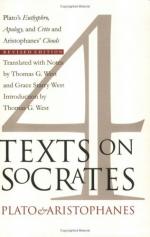
|
| Name: _________________________ | Period: ___________________ |
This test consists of 15 multiple choice questions and 5 short answer questions.
Multiple Choice Questions
1. What decision is Socrates faced with at the beginning of Crito?
(a) Whether to beg for his life, or suffer a more noble death.
(b) Whether to escape Athens with Crito's help, or suffer a life in prison.
(c) Whether to escape Athens with Crito's help, or face the death sentence.
(d) Whether to give up the location of his students, or suffer torture.
2. Socrates argues that, since Crito cares about public opinion, he must care about ... ?
(a) The authority of the law.
(b) The plight of the poor.
(c) The bitter fruit of irony.
(d) The iron hand of justice.
3. Which of the following is true about Socrates' possible disobeying of a law, according to Socrates in Crito?
(a) He would honoring an implicit contract he has with the citizens of Athens.
(b) He would be answering an evil with another evil.
(c) It would be for the good of Athens.
(d) It would only solidify the authority of Athens' lawmakers.
4. According to Socrates in Crito, what happens when individuals disagree on the matter of obeying or disobeying laws?
(a) One will usually break the law in defiance of the other.
(b) A new law is crafted from the synthesis of the two positions.
(c) They usually cannot convince one another of the other's position.
(d) The argument usually ends in violence.
5. What do experts have to do with laws?
(a) Universal laws of wisdom are the exclusive domain of the expert.
(b) Experts are called upon to evaluate laws.
(c) Only experts are able to tell when the law is broken.
(d) Law is derived from expertise.
6. Which is NOT one of the consequences of breaking a law according to Socrates?
(a) Undermining of general authority.
(b) Finality, and the reduction of the threat of retaliation.
(c) Corruption of the soul.
(d) The lessened ability for laws to serve their purpose.
7. What text does Pheidippides recite at the party Strepsiades throws for him?
(a) A play about rape.
(b) A dialogue in which Plato is humiliated by Socrates.
(c) A poem about thievery.
(d) A poem about incest.
8. Why does Strepsiades throw Pheidippides a party?
(a) Pheidippides successfully tricked Strepsiades' creditors.
(b) Strepsiades is celebrating Pheidippides' passage into manhood.
(c) Pheidippides has agreed to murder Socrates.
(d) Pheidippides is getting married.
9. According to The Clouds, what force holds communities and families together?
(a) Intellectual rigor.
(b) A faith in Zeus.
(c) The oracle at Delphi.
(d) Charity.
10. What stance does Strepsiades ultimately take in regards to Socrates' teachings?
(a) He rejects them, but is always bothered by what might have been.
(b) He embraces them and starts his own school.
(c) He rejects the teachings completely.
(d) He puts them to good use and becomes a lawyer.
11. What violent action does Pheidippides visit upon Strepsiades?
(a) He hangs him from a tree.
(b) He dunks his head in water to the point of drowning.
(c) He rapes him.
(d) He beats him.
12. What makes a law just, according to Socrates?
(a) Popular opinion.
(b) The authority of a city.
(c) Objective goodness.
(d) Piety.
13. What position does Strepsiades have in society?
(a) Elder.
(b) Playwright.
(c) Philosopher.
(d) Youth.
14. What plan does Crito have for Socrates?
(a) Crito plans to appeal to the higher court.
(b) Crito has an escape plan to break out of prison.
(c) Crito plans to launch an aggressive support campaign in town.
(d) Crito plans to murder Socrates in order to put him out of his misery.
15. What relationship is Crito to Socrates?
(a) Legal counsel.
(b) Student.
(c) Detractor.
(d) Friend.
Short Answer Questions
1. What relationship is Strepsiades to Pheidippides?
2. Which is the third and final Socratic dialogue written by Plato?
3. At a party, over what subject do Strepsiades and Pheidippides fight?
4. Strepsiades' ultimate fear about Pheidippides revolves around which taboo?
5. Who wrote The Clouds?
|
This section contains 612 words (approx. 3 pages at 300 words per page) |

|




